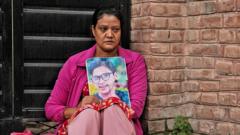Why Was a Protester Shot Dead Over Corruption in Nepal?

Published: 2025-09-15 17:55:21 | Category: technology
In the wake of violent protests in Nepal, families are mourning the loss of their loved ones, raising questions about accountability and justice following the tragic events that led to over 70 deaths. The outpouring of grief highlights the urgent need for government accountability amid escalating unrest and deep-rooted corruption.
Last updated: 15 October 2023 (BST)
Key Takeaways
- Over 70 people have died in recent protests against government corruption in Nepal.
- Families are demanding accountability from the authorities for the deaths of their loved ones.
- Protests erupted after a government ban on social media, exacerbating existing frustrations.
- The new interim Prime Minister faces significant challenges in restoring public trust and ensuring justice.
- The police have been accused of using lethal force against demonstrators.
The Unfolding Tragedy
The protests in Nepal, which started on 8 September, were ignited by a controversial government ban on social media platforms. This decision was perceived as an attempt to stifle free speech amid growing public discontent over corruption within the ruling class. As tensions escalated, demonstrators rallied in Kathmandu, demanding accountability and change.
Tragically, the protests turned deadly, with more than 70 individuals losing their lives and over 1,000 sustaining injuries during two days of chaos. Families like that of Narendra Shrestha, who lost his son Sulov, now find themselves grappling with unimaginable grief and anger.
The Human Cost of Unrest
Each victim tells a story of potential cut short. Sulov, just 21 years old, was among the young lives lost, leaving behind heartbroken family members who are left questioning the very fabric of the society they live in. As Mr Shrestha mourns, he asks, “Who will take responsibility for this?” His plea resonates with many others who have experienced similar losses.
Personal Stories of Loss
Rasik KC, another grieving relative, shared the anguish of learning about his nephew Rashik Khatiwada’s death through social media. Rashik was shot twice in the chest, a tragic fate that has left the family demanding justice. Similar stories of young lives cut short have emerged, with victims having aspirations such as becoming judges or serving their communities. Each name represents a future now lost, and each family is left with a void that cannot be filled.
The Role of Security Forces
Reports have emerged accusing police of using excessive force during the protests, with many claiming that they fired live ammunition into crowds. Eyewitnesses and medical personnel have recounted treating victims with serious injuries from both rubber bullets and what appeared to be sharp rifle injuries. Dr Santosh Paudel, who treated numerous patients at Bir Hospital, noted the alarming presence of both types of ammunition, suggesting a troubling escalation of police response.
The police have stated that they will conduct an investigation into the events surrounding the protests and the use of force. However, questions remain about who authorised the use of deadly measures against demonstrators. The need for accountability is urgent, as families seek answers in their time of mourning.
Government Response and Future Implications
The government, now under the leadership of interim Prime Minister Sushila Karki, faces a daunting task ahead. The recent upheaval has not only toppled the previous government but has also left the public with a deep mistrust of political leadership. Karki must navigate the path to restoring confidence and addressing the core issues that led to the protests.
One of her immediate challenges will be to ensure a thorough investigation into the violence, bringing to light those responsible for the deaths of protesters. Karki has promised fresh elections to be held on 5 March 2026, but the road to rebuilding trust will be fraught with obstacles.
The Importance of Accountability
As the nation wrestles with this tragedy, the call for justice is becoming louder. Families demand that those responsible for the deaths must be held accountable, not just through investigations but also through tangible actions that demonstrate a commitment to justice and reform. The loss of life during the protests is a stark reminder of the need for change in governance and police conduct.
The Broader Context of Protests
The protests were not solely about the social media ban; they were also a manifestation of deeper frustrations regarding government corruption and the perceived unresponsiveness of political leaders. The anger that culminated in violence had been brewing for weeks, as citizens expressed dissatisfaction with a system that they felt was failing them.
In this context, the protests can be viewed as part of a broader global trend, where citizens are increasingly willing to voice their frustrations against corrupt and ineffective governance. As social media serves as a powerful tool for organisation and communication, it has also become a focal point for governmental suppression, leading to heightened tensions.
A Call for Change
As the nation mourns, the urgent need for systemic change is clear. Calls for reform are not just about addressing the immediate issues but also about ensuring that such tragedies do not occur in the future. Citizens are demanding a government that is accountable, transparent, and responsive to their needs.
The tragic deaths during the protests could serve as a catalyst for much-needed reform in Nepal. The voices of the families affected must be heard, and their demands for justice should not be overlooked. As the interim government takes shape, it is imperative that they prioritise addressing the root causes of discontent and ensuring that accountability is at the forefront of their agenda.
FAQs
What sparked the protests in Nepal?
The protests were sparked by a government ban on social media platforms, which was seen as an attempt to suppress free speech amid growing discontent over corruption.
How many people died during the protests?
Over 70 individuals were reported dead as a result of the violence during the protests, with many more injured.
What actions are being taken by the government in response?
The interim Prime Minister has promised to conduct an investigation into the events and has committed to holding fresh elections on 5 March 2026.
What are the demands of the families of the victims?
Families of the victims are demanding accountability from the government and justice for the deaths of their loved ones, particularly regarding the role of the police during the protests.
What was the role of the police during the protests?
The police have been accused of using excessive force, including live ammunition, against protesters, leading to numerous deaths and injuries.
The recent events in Nepal serve as a poignant reminder of the fragility of democracy and the importance of holding those in power accountable. As the nation looks to rebuild, the voices of the bereaved must guide the path forward. #NepalProtests #JusticeForVictims #AccountabilityNow



